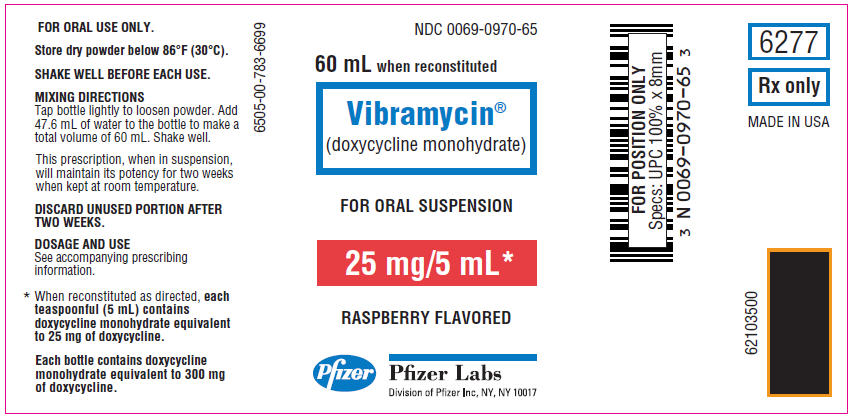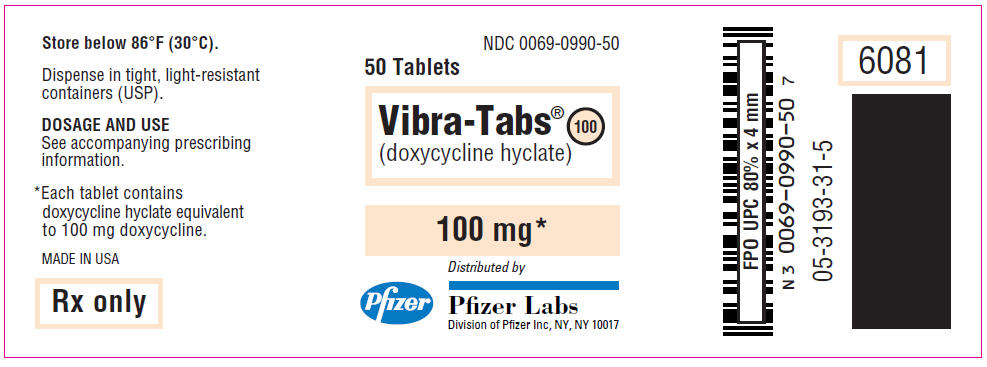For most of the drugs advantages of taking medications overweighs the potential risks however some drugs could be really dangerous for breastfed baby hence every medication shall be considered separately. In this page we will discuss about purpose of Vibramycin Monohydrate | Doxycycline Powder, For Suspension and its risk associated with lactation. We will also discuss the usage of Vibramycin Monohydrate | Doxycycline Powder, For Suspension and some common side effects associated with Vibramycin Monohydrate | Doxycycline Powder, For Suspension.
What is Vibramycin Monohydrate | Doxycycline Powder, For Suspension used for?
To reduce the development of drug-resistant bacteria and maintain effectiveness of Vibramycin and other antibacterial drugs, Vibramycin should be used only to treat or prevent infections that are proven or strongly suspected to be caused by susceptible bacteria. When culture and susceptibility information are available, they should be considered in selecting or modifying antibacterial therapy. In the absence of such data, local epidemiology and susceptibility patterns may contribute to the empiric selection of therapy. Treatment Doxycycline is indicated for the treatment of the following infections: Rocky Mountain spotted fever, typhus fever and the typhus group, Q fever, rickettsialpox, and tick fevers caused by Rickettsiae. Respiratory tract infections caused by Mycoplasma pneumoniae. Lymphogranuloma venereum caused by Chlamydia trachomatis. Psittacosis (ornithosis) caused by Chlamydophila psittaci. Trachoma caused by Chlamydia trachomatis, although the infectious agent is not always eliminated, as judged by immunofluorescence. Inclusion conjunctivitis caused by Chlamydia trachomatis. Uncomplicated urethral, endocervical, or rectal infections in adults caused by Chlamydia trachomatis. Nongonococcal urethritis caused by Ureaplasma urealyticum. Relapsing fever due to Borrelia recurrentis. Doxycycline is also indicated for the treatment of infections caused by the following gram-negative microorganisms: Chancroid caused by Haemophilus ducreyi. Plague due to Yersinia pestis. Tularemia due to Francisella tularensis. Cholera caused by Vibrio cholerae. Campylobacter fetus infections caused by Campylobacter fetus. Brucellosis due to Brucella species (in conjunction with streptomycin). Bartonellosis due to Bartonella bacilliformis. Granuloma inguinale caused by Klebsiella granulomatis. Because many strains of the following groups of microorganisms have been shown to be resistant to doxycycline, culture and susceptibility testing are recommended. Doxycycline is indicated for treatment of infections caused by the following gram-negative bacteria, when bacteriologic testing indicates appropriate susceptibility to the drug: Escherichia coli. Enterobacter aerogenes. Shigella species. Acinetobacter species. Respiratory tract infections caused by Haemophilus influenzae. Respiratory tract and urinary tract infections caused by Klebsiella species. Doxycycline is indicated for treatment of infections caused by the following gram-positive microorganisms when bacteriologic testing indicates appropriate susceptibility to the drug: Upper respiratory infections caused by Streptococcus pneumoniae. Anthrax due to Bacillus anthracis, including inhalational anthrax (post-exposure): to reduce the incidence or progression of disease following exposure to aerosolized Bacillus anthracis. When penicillin is contraindicated, doxycycline is an alternative drug in the treatment of the following infections: Uncomplicated gonorrhea caused by Neisseria gonorrhoeae. Syphilis caused by Treponema pallidum. Yaws caused by Treponema pallidum subspecies pertenue. Listeriosis due to Listeria monocytogenes. Vincent's infection caused by Fusobacterium fusiforme. Actinomycosis caused by Actinomyces israelii. Infections caused by Clostridium species. In acute intestinal amebiasis, doxycycline may be a useful adjunct to amebicides. In severe acne, doxycycline may be useful adjunctive therapy. Prophylaxis Doxycycline is indicated for the prophylaxis of malaria due to Plasmodium falciparum in short-term travelers (<4 months) to areas with chloroquine and/or pyrimethamine-sulfadoxine resistant strains. (See DOSAGE AND ADMINISTRATION section and Information for Patients subsection of the PRECAUTIONS section.)
Can I continue breastfeeding if I am using Vibramycin Monohydrate | Doxycycline Powder, For Suspension? How long does it stays in breast milk?
Vibramycin Monohydrate | Doxycycline Powder, For Suspension contains only one active ingredient that is Doxycycline anhydrous. We have analyzed the usage of Doxycycline anhydrous in breastfeeding and our analysis suggest that Doxycycline anhydrous poses Low risk for infant while breastfeeding and hence Vibramycin Monohydrate | Doxycycline Powder, For Suspension itself shall be considered Low risk item for breastfeeding.
Statement of Manufacturer/Labeler about breastfeeding usage
Nursing Mothers Tetracyclines are excreted in human milk; however, the extent of absorption of tetracyclines, including doxycycline, by the breastfed infant is not known. Short-term use by lactating women is not necessarily contraindicated; however, the effects of prolonged exposure to doxycycline in breast milk are unknown.4 Because of the potential for serious adverse reactions in nursing infants from doxycycline, a decision should be made whether to discontinue nursing or to discontinue the drug, taking into account the importance of the drug to the mother. (See WARNINGS.)
Vibramycin Monohydrate | Doxycycline Powder, For Suspension Breastfeeding Analsys
Low RiskCAS Number: 564-25-0
Excreted into breast milk in quantities that would be clinically significant, however, intestinal absorption by infant's gut is hampered because of formation of chelating products by union with the milk's calcium. Tetracycline is at lesser amount excreted into breast milk and at higher proportion bound to calcium, hence, it is fewer absorbed than Doxycycline. Thus, it is a optimal alternative while breastfeeding. Long-term treatments are not recommended (over 3-4 weeks) since it may cause damage of the growth cartilage, teeth discoloration and imbalance of intestinal flora. Be aware of false negative results that may be obtained from infants with bacterial cultures when the mother is on antibiotics.
Vibramycin Monohydrate | Doxycycline Powder, For Suspension Breastfeeding Analsys - 2
CAS Number: 564-25-0
A number of reviews have stated that tetracyclines are contraindicated during breastfeeding because of possible staining of infants' dental enamel or bone deposition of tetracyclines. However, a close examination of available literature indicates that there is not likely to be harm in short-term use of doxycycline during lactation because milk levels are low and absorption by the infant is inhibited by the calcium in breastmilk. Short-term use of doxycycline is acceptable in nursing mothers. As a theoretical precaution, avoid prolonged or repeat courses during nursing. Monitor the infant for rash and for possible effects on the gastrointestinal flora, such as diarrhea or candidiasis (thrush, diaper rash).

What should I do if I am breastfeeding mother and I am already exposed to Vibramycin Monohydrate | Doxycycline Powder, For Suspension?
Vibramycin Monohydrate | Doxycycline Powder, For Suspension is in the category of low risk, if you have already used it then its not a big deal if health and behavior of baby is good. However your health care provider shall be aware of the fact that you have used Vibramycin Monohydrate | Doxycycline Powder, For Suspension so you should inform him based on your convenience.
My health care provider has asked me to use Vibramycin Monohydrate | Doxycycline Powder, For Suspension, what to do?
Though Vibramycin Monohydrate | Doxycycline Powder, For Suspension dose not comes in category of safe drugs rather it comes in category of low risk but if your doctor is aware that you are breastfeeding your baby and has still recommended it then its advantages must be outweighing the risks.
If I am using Vibramycin Monohydrate | Doxycycline Powder, For Suspension, will my baby need extra monitoring?
Not much monitoring required while using Vibramycin Monohydrate | Doxycycline Powder, For Suspension
Who can I talk to if I have questions about usage of Vibramycin Monohydrate | Doxycycline Powder, For Suspension in breastfeeding?
US
National Womens Health and Breastfeeding Helpline: 800-994-9662 (TDD 888-220-5446) 9 a.m. and 6 p.m. ET, Monday through Friday
UK
National Breastfeeding Helpline: 0300-100-0212 9.30am to 9.30pm, daily
Association of Breastfeeding Mothers: 0300-330-5453
La Leche League: 0345-120-2918
The Breastfeeding Network supporter line in Bengali and Sylheti: 0300-456-2421
National Childbirth Trust (NCT): 0300-330-0700
Australia
National Breastfeeding Helpline: 1800-686-268 24 hours a day, 7 days a week
Canada
Telehealth Ontario for breastfeeding: 1-866-797-0000 24 hours a day, 7 days a week
Drug Brands with same Active ingredients



